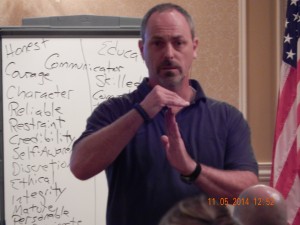Chaplain Grant Wolf of the Chattanooga, TN Police Department is compiling an anthology of “stories of faith and courage” from law enforcement personnel for a book to be published for world-wide distribution. The book will be in the form of a daily devotional – 365 stories, one for each day of the year – where members of the law enforcement community sensed the presence of God in some event relating to their work.
Stories are sought from sworn officers, chaplains, 9-1-1 dispatchers, jailers, civilian support staff, spouses and family members in situations where the person submitting the story strongly felt that what occurred was beyond the realm of normal expectations.
Stories received to date run the gamut from light-hearted (a rookie who passed out while helping deliver a baby) to not-for-the-faint of heart (a bank shooting and a fatal auto accident). They represent every phase of law enforcement work and demonstrate that something happened relating to the incident which simply cannot be explained other than by God’s hand.
Download this link for a brochure explaining the law enforcement faith and courage project.
I have known Chaplain Wolf for many years having first met him when he served as Executive Director of The Fellowship of Christian Peace Officers. Let’s see if the Police Dynamics Community can support his project…
Police work is one of the most stressful jobs imaginable. But what is it that makes law enforcement so full of stress? Is it the crazy hours, dealing with people at their worst, riding a roller-coaster of emotions, or something more? Join me as we answer these questions and talk about the number one stressor of police work.
Law enforcement officers operating out from under authority tend to take things personally, rather than professionally. Since they reject the proper relationship with their authority, they build walls of hostility, take personal offense, and take it out on the individual they are dealing with. You can trace virtually every instance of police misconduct back to a violation of this ethical principle.
Bitterness is like a cancer that eats away at your heart and infects others. Good character builds strong relationships. But a root of bitterness destroys them. In this video we look at the effects of bitterness and the two levels of forgiveness.
by Kevin Woodside, The Modern Knight
“When pride comes, then comes disgrace, but with humility comes wisdom.” Solomon, 1011-932 BC; Proverbs 11:2 NIV
“Humility is the solid foundation of all virtues.”
Confucius, 551-479 BC“Humility is the foundation of all the other virtues hence, in the soul in which this virtue does not exist there cannot be any other virtue except in mere appearance.”
St. Augustine, 354-430 AD
Humility easily passes the ancient principle test as a solid foundation for personal character and it makes sense that a humble spirit is an inoculation against our own abuse of power. It is also easier from this perspective to see that submission to legitimate authority is the only way to morally wield power over another. While that makes sense for the authority you have been given, what about the authority you are under? Wouldn’t humble submission to illegitimate authority be a disaster? How can you avoid that? How can you know the difference?
The first step is understanding that a column (remember the illustration) topped with “society” as the ultimate authority is incomplete. This system still leaves room for the fickle influence of culture, the rise of a tyrant, or any number of other influences that could jeopardize moral authority. The column that is limited to authority created by man is always going to be vulnerable. So how do you and I, the dwellers of the middle of the column, have confidence that we are submitting wisely and that our humility doesn’t set us up as fools? By recognizing that our column, every column, is topped by something higher than itself, each is under the original source of all authority.
“One Nation Under God…”
These are words that are in our Pledge of Allegiance, but what do they really mean? God is the author of authority and everything that comes from Him is reliably legitimate. If we mean what we say in the national pledge our insurance policy against backing the wrong leader is to make sure that we, and everyone above us in the column, is lined up under God. Unlike society, a boss on the job, or a political leader, God does not change. His authority is trustworthy. So what does lining up under God mean?
“It means giving God more weight in your life than anything else, so that if you face a decision where every inclination of your heart says no and yet to honor God you would have to say yes, you would say yes – because God carries more weight for you than every other inclination of your heart.”
Colin S. Smith
That is a big personal commitment, but being under God means having an unmoving standard of ultimate legitimate authority to measure everyone and everything else against, which in Smith’s words, “is the basis for our rejection of tyranny…(and) leaves no room for dictatorships.” Are you ready for that?
Editor’s Note: The Modern Knight is written and maintained by my colleague, Kevin Woodside. More of his teachings on the timeless principles of character can be found on his Modern Knight website. I appreciate Kevin’s commitment to character and his permission to publish this work on the Police Dynamics Media Blog.


